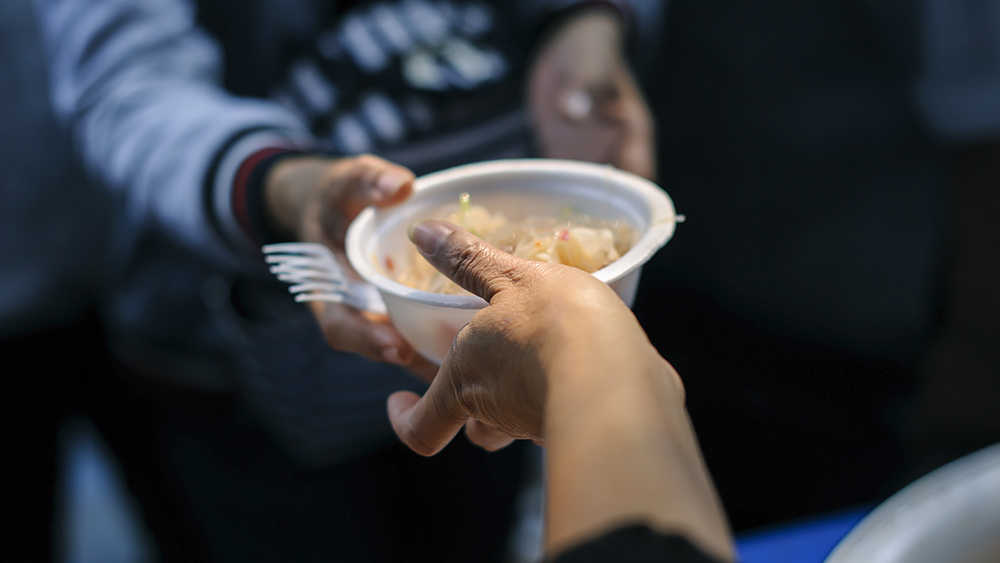Tips for eating on rations from the Great Depression: Recipes the Greatest Generation grew up on
06/20/2018 // Rhonda Johansson // Views
Tags: food austerity, food rationing, food security, Great Depression, how to ration, lessons learned, preparedness, ration, rationing food, rationing tips, survival, World War II

Take note that these tips will prove to be very useful when disaster strikes and you can’t just run to the nearest grocery store. (h/t to Survivopedia.com.)
- Know what is inexpensive and can be used both as a main ingredient and as a leftover -- Now is not the time to turn your nose away from versatile food. We’ve become accustomed to throwing away food that is partially used or no longer “fresh.” This is a waste, considering that many items are perfectly edible even if they are just “leftovers.” Take, for example, the humble potato. Using leftover mashed potatoes, you can make pancakes that can serve as a meal. Beans are another example.
- Maximize bread -- Every crumb counts. The second World War gave birth to many recipes that used stale bread as a base for many delicious dishes. The “fairy toast” in particular was hailed for being both easy to make and having a long shelf life. Most recipes using stale bread were for desserts, so a lot of the recipes you’d find call for sugar but you can make these healthier by using dried fruit or honey.
- Learn how to forage -- Take the time to know the various plants and weeds growing near you. You’d be surprised: A lot of them are actually good for you and taste okay, too. The beautiful part is that it is likely -- depending on where you live, of course -- that these plants are not sprayed with toxic pesticides. Try looking for dandelions and edible mushrooms around your area. You can use these to make a nice, refreshing salad.
- Use, store, and refrigerate -- Garbage soup was very popular during the Great Depression. Despite its name, the soup did not use actual trash but leftover vegetable scraps and bones that were used within the week and then refrigerated. At the end of each week, these ingredients were placed into a pot, brought to a boil, and then eaten. (Related: 4 Invaluable lessons from the Great Depression you need to remember.)
- Grow your own food -- If you can, take the time now to build your own small garden. You don’t have to be fancy, either. Grow the vegetables that you like, or that fit your current gardening skill. We’d recommend trying tomatoes which is an easy crop for people to grow, and more importantly, preserve. The tomato is also an extremely versatile fruit that can be used for many recipes.
- Use vinegar -- Most Americans don’t like the taste of vinegar, but trust us: This liquid can be used in various recipes to replace more conventional items that will probably run out during emergencies. Vinegar can also be made at home so this will save on expenses. When done correctly, you can make a vinegar pie that is just as tasty as any other dessert.
- Stretch food with fillers -- Luxuries such as a beef will most likely be non-existent during times of crisis. Stretch your protein requirements with fillers such as grains, corn, rice, and lentils.
- Know to preserve -- If you can get your hands on meat, you should know how to extend its shelf life. Begin to learn the basics of how to cure, dry, or smoke meat.
- Know the cheaper cuts of meat -- We suggest trying these cuts instead: tongues, livers, shins, shanks, and brains. These parts are considered “undesirable” by some and are normally cheaper. Cooked correctly, however, these meat cuts are actually pretty delicious.
Most importantly, be creative. Don’t depend on the standard way of cooking or doing things. Do your research and don't disregard suggestions that may seem a little “weird.”
Sources include:
Related Topics
food austerity food rationing food security Great Depression how to ration lessons learned preparedness ration rationing food rationing tips survival World War IILatest News
Related News
11/09/2023 / By Arsenio Toledo
10/06/2023 / By Ramon Tomey
05/31/2023 / By Ethan Huff
05/04/2023 / By Ethan Huff
Take Action:
Support Natural News by linking to this article from your website.
Permalink to this article:
Copy
Embed article link:
Copy
Reprinting this article:
Non-commercial use is permitted with credit to NaturalNews.com (including a clickable link).
Please contact us for more information.
Please contact us for more information.























